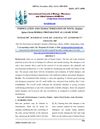10 citations,
March 2005 in “International Journal of Cosmetic Science” Oxidation changes human hair by breaking down fats and forming new acidic groups, affecting how it interacts with conditioners and cosmetics.
 14 citations,
May 2022 in “Asian Journal of Pharmaceutical Sciences”
14 citations,
May 2022 in “Asian Journal of Pharmaceutical Sciences” New hair follicle-targeting treatments show promise for hair disorders but need more research on safety and effectiveness.
 May 2018 in “Cell stem cell”
May 2018 in “Cell stem cell” Myoepithelial cells can repair airways after severe injury.
 7 citations,
July 2004 in “International Journal of Cosmetic Science”
7 citations,
July 2004 in “International Journal of Cosmetic Science” Different hair types from various ethnic groups affect hair shine due to characteristics like thickness and shape.
4 citations,
June 2016 in “PubMed” Repeated dyeing and shampooing cause hair color loss and damage.
 2 citations,
December 2019 in “Textile Research Journal”
2 citations,
December 2019 in “Textile Research Journal” L-cysteine and ultrasound successfully improved rabbit hair fibers for industrial use.
 205 citations,
July 2009 in “Journal of Dermatological Science”
205 citations,
July 2009 in “Journal of Dermatological Science” Male and female skin differ in many ways, which could lead to gender-specific skin treatments.
 16 citations,
August 2014 in “Archives of Pharmacal Research”
16 citations,
August 2014 in “Archives of Pharmacal Research” Special nanoparticles increased skin absorption of hair loss treatments with fewer side effects.
39 citations,
March 2022 in “Nature Protocols” Scientists created hair-growing skin models from stem cells, which could help treat hair loss and skin diseases.
9 citations,
January 2010 in “Biological and medical physics series” The book was the first to focus on the biophysical properties of hair.
13 citations,
March 2017 in “Skin Research and Technology” Formaldehyde damages curly hair more than glyoxylic acid.
March 2009 in “CRC Press eBooks” Hair conditioner makes wet hair easier to comb by reducing friction.
 September 2022 in “International journal of pharmaceutical quality assurance”
September 2022 in “International journal of pharmaceutical quality assurance” The herbal shampoo is less damaging and improves hair's appearance.
 August 2024 in “Cosmetics”
August 2024 in “Cosmetics” K18® and Olaplex® both effectively repair bleached hair, improving its strength, smoothness, and overall health.
 30 citations,
December 2018 in “International Journal of Biological Macromolecules”
30 citations,
December 2018 in “International Journal of Biological Macromolecules” Chitosan and surface-deacetylated chitin nanofibers may help treat hair loss.
 February 2016 in “Online journal of biological sciences”
February 2016 in “Online journal of biological sciences” Henna and honey improved burn healing and hair growth in rabbits.
 April 2017 in “Journal of Investigative Dermatology”
April 2017 in “Journal of Investigative Dermatology” Applying pseudoceramide improved skin and hair health.
 July 2024 in “ADMET & DMPK”
July 2024 in “ADMET & DMPK” Surface-modified nanostructured lipid carriers can improve hair growth treatments.
1 citations,
February 2003 UV radiation causes significant protein loss and color changes in hair, especially blond hair.
 89 citations,
January 2009 in “Advances in Clinical Chemistry”
89 citations,
January 2009 in “Advances in Clinical Chemistry” Fetal skin heals without scarring due to unique cells and processes not present in adult skin healing.
January 2006 in “东华大学学报:英文版” Microwave plasma treatment improves yak hair dyeing.
 42 citations,
September 2017 in “Advances in protein chemistry and structural biology”
42 citations,
September 2017 in “Advances in protein chemistry and structural biology” Surface Plasmon Resonance is a useful tool for studying protein interactions and has potential for future technological advancements.
 70 citations,
August 2020 in “Nanomaterials”
70 citations,
August 2020 in “Nanomaterials” Electrospun nanofibers show promise for enhancing blood vessel growth in tissue engineering but need further research to improve their effectiveness.
 47 citations,
April 2017 in “European Journal of Pharmaceutics and Biopharmaceutics”
47 citations,
April 2017 in “European Journal of Pharmaceutics and Biopharmaceutics” The new dutasteride formula can be applied to the skin, may promote hair growth, and has fewer side effects.
1 citations,
January 1988 Cosmetic treatments after chlorination damage hair more than treatments before.
 2 citations,
February 2016 in “Journal of sol-gel science and technology”
2 citations,
February 2016 in “Journal of sol-gel science and technology” A small molecule can strengthen fine hair, making it more resistant and natural-feeling.
 November 2022 in “International journal of biology, pharmacy and allied sciences”
November 2022 in “International journal of biology, pharmacy and allied sciences” The new herbal shampoo is effective, safe, and more affordable than other products.
 3 citations,
August 2021 in “Journal of fiber science and technology”
3 citations,
August 2021 in “Journal of fiber science and technology” Chitin nanofibrils are better at stabilizing oil droplets in emulsions than cellulose nanofibrils.
 35 citations,
April 2006 in “Ocular Surface”
35 citations,
April 2006 in “Ocular Surface” Cosmetics and procedures can cause eye issues, from mild discomfort to serious conditions, due to allergies, toxins, or poor care.
 3 citations,
June 2007 in “Journal of Cosmetic Dermatology”
3 citations,
June 2007 in “Journal of Cosmetic Dermatology” Using the right hair care products can improve hair health and help manage hair disorders.




















